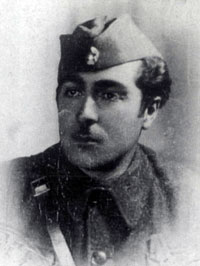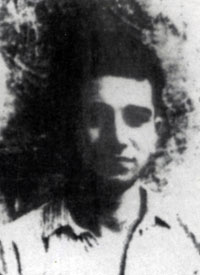Jewish partisans from Monastir
 On 22 June 1941, Nazi Germany invaded the Soviet Union. Heading the Regional Communist Central Committee was an open supporter of Bulgaria. The Macedonians were split over the question of annexation – did the annexation of Macedonia to Bulgaria mean liberation or occupation? This dilemma continued for two years, and for a long while almost no action was taken against the fascists. A few isolated incidents of sabotage are recorded, as well as the establishment of a few groups of rebels that soon failed and broke up. Those Jews willing to join battle units went underground and organized attacks – and then fled in the face of military might.
On 22 June 1941, Nazi Germany invaded the Soviet Union. Heading the Regional Communist Central Committee was an open supporter of Bulgaria. The Macedonians were split over the question of annexation – did the annexation of Macedonia to Bulgaria mean liberation or occupation? This dilemma continued for two years, and for a long while almost no action was taken against the fascists. A few isolated incidents of sabotage are recorded, as well as the establishment of a few groups of rebels that soon failed and broke up. Those Jews willing to join battle units went underground and organized attacks – and then fled in the face of military might.
Earlier, in May 1941, about a month after the annexation of Macedonia to Bulgaria, approximately 100 rifles and some ammunition was stockpiled in the house of Benjamin Russo, in the hope that it would be used against the Nazis and their collaborators.
Despite their difficult circumstances and the constricted living space in the Jewish quarter, the Jews of Monastir attempted underground activities: Jewish homes were used to store and repair weapons, make copies of and distribute propaganda material, collect equipment for first aid and give shelter to the partisans. Totaling some 10 percent of the town’s overall population, the Jews comprised close to three-quarters of all underground activists.
Even though the heads of the communist parties warned the young Jews against joining combat units, many initiatives taken by the youth of Monastir to find a way to join different partisan units succeeded.
The partisans fought against the Chetnics (Yugoslav units that supported the Germans), the Bulgarian , German and Italian units. Each member of the underground was given a nickname, making it is difficult to know the exact number of Jewish fighters. The estimate is that dozens of young Jewish men and women from Monastir fought in the different units. In 1942, Victor Meshulam (known as “Bustrik”), Mordechai Todelano (“Spiro”) and Joseph Russo (“Pipo”) joined the “Damyan Gruev” unit (named after the Macedonian hero who fought in the 1903 revolt against the Turks). Joining the “Yana Sandrinski” unit were: Benjamin Russo (“Kiki”), Mordo-Mordechai Nachmias (“Lazo”) and Nissim Alba (“Miki”). Aharon Aroesti and Yosef Lazar were returned to Monastir with the suggestion that they continue to operate in their local underground unit. On the eve of the deportation, in March 1943, eight more youths managed to join the partisans: Shlomo Sadikario (“Mo”), Shmuel Sadikario (“Simoliko”), Albert Kasorela (“Berto”), Albert Russo (“Kote”), Estreja Ovadja (“Mara”), Jamila Kolonomos (“Tsveta”), Stella Levi (“Lena”) and Adela Faradji (“Kata”).
Joining the Greek partisan units were: Shmuel Kalderon (“Bima”), David Kalderon, Marcel Demajo, Joseph Pipo Hason, Mantesh Ischach, Pinchas Ischach and Helena Leon Ishach. In addition, the brothers Albert (Avraham Segev) and Moshe Kasorela, and Joseph and Shimon Aroesti fled Monastir. They waited for a partisan unit to contact them, but when the message was delayed, they fled to Albania, where they joined the partisans after the Italian surrender.
One of the first fighters was Rafael Bationo, one of the organizers of the anti-fascist revolt in the Sanjak region. Bationo, known by his underground name as Misha Tzevtakovich, was killed in battle in 1942. Aharon Aroesti, Marcel Demajo, Mordechai Todelano, Mordo-Mordechai Nachmias, Estreja Ovadja, Joseph Piso, Shlomo Sadikario, Shmuel Sadikario, Yitzhak Sarfati and others also lost their lives in battle. Many of those who died were senior officers. Shlomo Sadikario, who was killed in the battle at Kumanovo, was the commissar of the brigade. His brother Shmuel, who was commissar of the parachute regiment, was killed in 1945.
Among the partisans was a parachutist from the Jewish Brigade, Nisim Testa-Arazi, born in Monastir, who parachuted into Serbia in April 1944. When Testa volunteered to parachute into enemy territory, he didn't know that his entire family, which he had left behind in Monastir when he emigrated to Eretz Israel in 1939, were already dead.

 Victor Meshulam was known by his underground name “Bustrik,” which stuck to him for the rest of his life. He was born in Monastir to an underprivileged family. By 1941 Meshulam had joined the Macedonian resistance movement, reaching the rank of colonel. After the war he served in the Yugoslav army and as the Yugoslav military attaché in Turkey. He and his family emigrated to Israel in 1952.
Victor Meshulam was known by his underground name “Bustrik,” which stuck to him for the rest of his life. He was born in Monastir to an underprivileged family. By 1941 Meshulam had joined the Macedonian resistance movement, reaching the rank of colonel. After the war he served in the Yugoslav army and as the Yugoslav military attaché in Turkey. He and his family emigrated to Israel in 1952. Mordechai Nachmias was also known by his underground name “Lazo.” He was born in 1922 in Monastir to a family of craftsmen. In the interwar years, his family wandered across Yugoslavia, searching for ways to make living. After the occupation of Yugoslavia in 1941, Nachmias returned to Monastir, joined the local underground communist party and became one of its leaders. He worked in an underground weapons workshop, and also helped organize partisans in the region. His house became the Monastir underground headquarters. In September 1942 he left the city, joined the Macedonian partisan unit operating in the area, and headed the company during the battle in which it took part. At the beginning of 1944 he was appointed deputy head of the regiment of the Seventh Partisan Brigade, and that summer led his regiment in the attack to liberate his hometown. On 25 August 1944 he conducted a battle on a ridge of mountains on the Greek-Yugoslav border, where German soldiers were entrenched in armed bunkers. The exposed partisans, with Nachmias at their lead, battled the fortified formation. Their victory led to the liberation of Monastir, but the soldiers of the regiment paid a heavy price with the death of their Jewish leader. Nachmias was posthumously awarded the highest medal of honor of Yugoslavia – “The Order of the People’s Hero.”
Mordechai Nachmias was also known by his underground name “Lazo.” He was born in 1922 in Monastir to a family of craftsmen. In the interwar years, his family wandered across Yugoslavia, searching for ways to make living. After the occupation of Yugoslavia in 1941, Nachmias returned to Monastir, joined the local underground communist party and became one of its leaders. He worked in an underground weapons workshop, and also helped organize partisans in the region. His house became the Monastir underground headquarters. In September 1942 he left the city, joined the Macedonian partisan unit operating in the area, and headed the company during the battle in which it took part. At the beginning of 1944 he was appointed deputy head of the regiment of the Seventh Partisan Brigade, and that summer led his regiment in the attack to liberate his hometown. On 25 August 1944 he conducted a battle on a ridge of mountains on the Greek-Yugoslav border, where German soldiers were entrenched in armed bunkers. The exposed partisans, with Nachmias at their lead, battled the fortified formation. Their victory led to the liberation of Monastir, but the soldiers of the regiment paid a heavy price with the death of their Jewish leader. Nachmias was posthumously awarded the highest medal of honor of Yugoslavia – “The Order of the People’s Hero.” 



